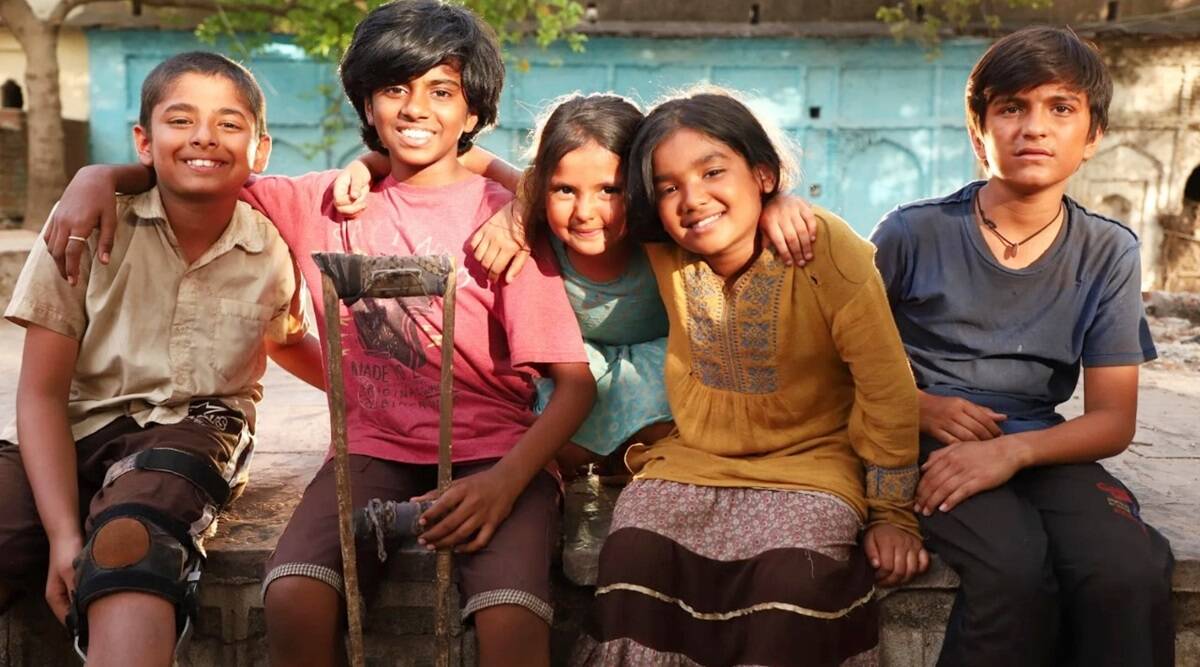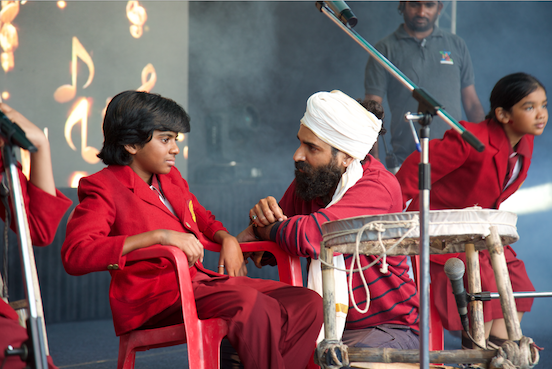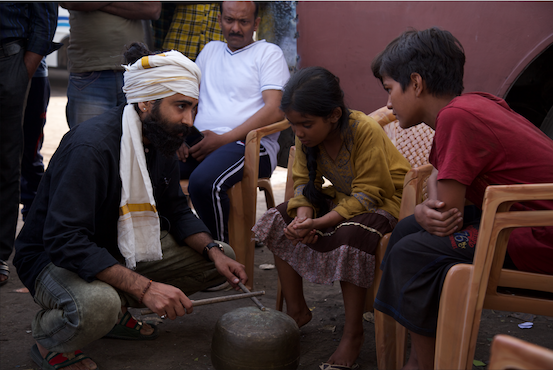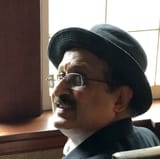Lydian Nadhaswaram: From Musician to Actor – and Back

The least that can be said of Lydian Nadhaswaram is that he is creatively innovative. The 14-year-old has made a series of impacts in music and now also in film. The music prodigy drew worldwide attention in March 2019 when he won the reality talent show The World’s Best, on the American television channel CBS. The veteran Malayalam film actor Mohanlal, who will make his directorial debut in the children’s fantasy film Barroz, chose Lydian to be its music director. The shooting of Barroz has been postponed to next year due to the Covid-19 pandemic. But September 5, 2020 marks the release of the Hindi film Atkan Chatkan where Lydian plays the main character, Guddu, his first foray into acting.
https://www.instagram.com/p/B9hXrMrArJO/
I asked Lydian what he had done in the year and a half since winning The World’s Best. A lot, it turns out. The highlights follow.
Concerts of All Hues and Stripes
Lydian was invited to perform in concerts all over India, and also abroad by the social organizations of expatriate Indians living in several countries, including Australia, Singapore, Malaysia, Kuwait, the United States, the United Arab Emirates, and the United Kingdom. At many of these events, Lydian was joined on stage by his father Sathish Varshan and his sister Amirthavarshini. The most memorable of these was in Kuala Lumpur in August 2019 when Lydian and Amirthavarshini joined the renowned singer S.P. Balasubrahmanyam in concert performing the music of Ilaiyaraja. In some of the other shows for the Indian diaspora, Lydian threw in a Western classical music piece, which the audiences — who were really there only for Indian film music — appreciated, underlining one of Lydian’s accomplishments: opening up Indian minds to Western classical music, and by extension, to music from other parts of the world they may previously have ignored.

Three concerts in which Lydian participated which stand out are the music festival Światowy Festiwal Sztuki “Genesis” in Krosno, Poland, in September 2018; the jazz concert “A Great Night in Harlem” in New York in April 2019; and the closing concert of the Symphony Orchestra of India’s Autumn 2019 season in Mumbai.
The concert in Poland was Lydian’s stage debut in Europe, and it occurred in the homeland of one his favourite composers, Fryderyk (Frédéric) Chopin. But there were language issues; other than Polish, people in that region of Poland only speak French. Thus Lydian discovered that there were places in the world — and in Europe, no less — where English is non-existent. He also did not take kindly to Polish food. But such things were dismissed when it came to performing.

Moreover, his two appearances at “Genesis” were benefit performances for the organisation Czyń Dobro Mimo Wszystko, which raises funds for ill and needy children. The festival was a treat, Lydian said. All the musicians and singers were excellent. Lydian played selections from Beethoven, Haydn, Rimsky-Korsakoff, Albéniz, and of course, Chopin. He also sang (at the organiser’s request) a French song, pronouncing the French lyrics after learning them by heart. The performances were well received, both audiences giving him a long standing ovation, making him return repeatedly to the stage to take yet another bow.
Lydian had to leave for the United States immediately after his performances, and so could not make the “pilgrimage” to Warsaw to see the famous Chopin Museum or the house where Chopin grew up. A consolation was that his flight to the States took off from Vienna, and he was astounded how many airport shops sold an array of merchandise focussed on music, from busts of Mozart and Beethoven and Brahms to music boxes and music books. There was even confectionery named after Mozart, the Mozartkugel.

“A Great Night in Harlem” is the annual gala event of The Jazz Foundation of America, held at the historic Apollo Theatre in Harlem, whose stage has been graced down the years by iconic singers and musicians including Duke Ellington, Dizzy Gillespie, Louis Armstrong, Mahalia Jackson, Aretha Franklin, Ray Charles, Ella Fitzgerald, and Diana Ross and the Supremes. The 2019 event was to confer Lifetime Achievement Awards on two greats, both in their nineties: Harry Belafonte (who was unable to attend), and Tony Bennett, who had no prepared speech but sang some hit songs from his career, including his signature song, “I Left My Heart in San Francisco.” Other performers included Savion Glover and Patience Higgins, the Count Basie Orchestra, Patti Smith, Lenny Kaye, and Tony Shanahan.

Michael Novogratz, the New York financier, arts and culture dilettante, and philanthropist, who is on the Board of Directors of The Jazz Foundation of America, felt that while it was great to have a variety of established musicians, the event should also introduce musicians who would become the big names of the future. Novogratz recognized Lydian’s talent before Lydian achieved the name recognition he has today after hearing Lydian play at a music salon in New York. It so impressed him that he gifted Lydian every pianist’s dream: a Steinway grand. At the concert, his first live stage appearance in America, Lydian played a jazz medley of three songs: Misty, Spain, and Autumn Leaves. Writing in Billboard magazine, music journalist Bryan Reesman described Lydian as “the Indian piano prodigy” and commented: “His speed and agility along the ivories was impressive.” During their meeting, Tony Bennett gave Lydian the thumbs-up for choosing Spain and Autumn Leaves.
At the time, Lydian was acting in a Hindi film, Atkan Chatkan, in Jhansi, Uttar Pradesh, so it was a mad four-day dash to New York and back. Lydian gave a captivating recital, drawing energy from within to perform while he was still jet-lagged.
While the SOI Autumn 2019 Season ended last night, it left us with a bittersweet feeling after the enthralling performance by Lydian Nadhaswaram and Alexander Lazarev’s houseful concert.
Were you there?#SOI #SymphonyOrchestraofIndia #Autumn2019season pic.twitter.com/56SArGhYqs
— Symphony Orchestra Of India (@SOIMumbai) September 28, 2019
Lydian played Haydn’s Piano Concerto in D Major (No. 11) at the concluding concert of the Autumn 2019 season of the Symphony Orchestra of India at the National Centre for the Performing Arts, Mumbai. The orchestra was conducted by Alexander Lazarev who, among his many distinctions, had the rare privilege of simultaneously holding two positions at The Bolshoi Theatre: Chief Conductor and Artistic Director. Lydian played to a full house; the event was sold out. Lydian said he was gratified by Lazarev’s praise after the performance.
Music in the Time of Corona
When the coronavirus pandemic swept across the world leading to lockdown, music activities like concerts came to a halt. Lydian by now was steadily gaining subscribers to his YouTube channel, and he, his father, and sister make a decision to post a new video on a daily (or almost daily) basis during the lockdown. These included Western classical music recitals, jazz pieces, and Tamil film song recreations. Lydian explained that he called them recreations instead of covers because they played all the original music notes but used the latest sound technology, resulting in a superior quality and clarity of sound. But when they started this project, they had not expected the quarantine to go much beyond the stipulated 21 days. They gave each video their all, and it was physically and mentally taxing. So after a month they stopped the daily video postings. Instead, they set their sights on a highly ambitious project: performing the second movement of Ilaiyaraja’s symphony-oratio Thiruvasagam.
In 1993, Ilaiyaraja created history by becoming the first Indian (as well as the first Asian) to compose a Western music symphony. The Royal Philharmonic Orchestra (RPO) in London agreed to perform it but wanted the complete score three months in advance. Because of Ilaiyaraja’s film commitments, two months went by. Ilaiyaraja then wrote the entire symphony within a month, an epic work of staggering genius. The musicians of the RPO were overawed and were profuse in their compliments to Ilaiyaraja. But for reasons still unclear, the recording has never been released.
In 2005, Ilaiyaraja wrote a six-movement symphony-oratio Thiruvasagam, which involved a 120-member chorus. Thiruvasagam is a famous collection of Shiva hymns composed by Manicka Vasagar, a sage who also was the court poet to Varaguna Varman II, the Pandya King who ruled from Madurai in the 9th century CE. Selections from the Tamil epic were set to orchestral and choral music by Ilaiyaraja. Modes and scales reminiscent of Carnatic music ragas and Indian vocal techniques are effortlessly combined with various elements of Western classical music, chorale and orchestral. The Budapest Symphony Orchestra under László Kovács performed it in full, and a recording of this, the first Indian oratio, is available.
Of the six movements, the second, titled Polla Vinaiyen, is the longest, a full twenty minutes. Of this movement, the San Francisco poet and arts writer Michael McDonagh commented: “…the divine contrasted with our flawed, all-too-human state, a point of view shared by all religious traditions.”
To reflect the essence of the poem (the Divine contrasted with the Human) in a novel way, American lyricist Stephen Schwartz translated selected Tamil verses into English and included them in the score. Here is an example:
So many forms I must wear!
எல்லா பிறப்பும் பிறந்திளைத்தேன்
பிறந்திளைத்தேன் ! பிறந்திளைத்தேன் ! பிறந்திளைத்தேன் !
So many lives I must bear! I must bear!
புல்லாகிப் பூடாய்ப் புழுவாகி மரமாகி
Grass and shrub and stone and tree
பல்விருகமாகிப் பறவையாய்ப் பாம்பாகி
பறவையாய்ப் பாம்பாகி
Worm and bird and beast and demon
Learn the sky and turn the earth.
நமசிவாய வாழ்க ! நாதன் தாள் வாழ்க !
நமசிவாய வாழ்க ! நாதன் தாள் வாழ்க !
Hail, Hail! I sing Hail!
Hail, Hail! Joyful Hail!
McDonagh writes: “Stephen Schwartz’s lyrics…give a mellifluous yet almost foursquare rendition vis-á-vis Ilaiyaraja’s rhythmically free one. His setting of this hymn is varied and highly imaginative, especially his use of small men’s chorus, which alternates with his plaintive solo.”
Here is Polla Vinaiyen, performed by Lydian, Varshan, & Amirthavarshini. Lydian not only sings the English lines but takes on most of the instrumentation, turning into a one-man orchestra. The best multi-instrumentalist still cannot reproduce the full sound of a hundred-piece orchestra, and deciding which instrument to include and which to leave out also determines the tenor of the recital. Lydian took two days to complete the sequencing. The recreation had over 5000 musical elements and over 200 instrumental music tracks on his music software.
Polla Vinaiyen, the second movement of Ilaiyaraja’s symphony-oratio, Thiruvasagam, performed by Lydian Nadhaswaram, Varshan, and Amirthavarshini
So impressed was Ilaiyaraja that he made a video phone call to Lydian and his family within hours after the YouTube upload, and they had a spirited conversation. Ilaiyaraja was to make a video applauding the first-line fighters battling the coronavirus pandemic in India, and he asked Lydian to arrange the music.
https://www.instagram.com/p/B_xMoIMgSJn/
When Lydian had done so, Ilaiyaraja made suggestions about tweaking the music – add this here, change this there, include this chord here – and Lydian was happy to learn a thing or two from the maestro. That video, Bharat Bhoomi, has a Hindi and a Tamil version.
A film centred on music – Atkan Chatkan
In a surprising move – yet, on second look, perhaps not all that surprising – Lydian has acted in a Hindi feature film, Atkan Chatkan. The story is centered on Guddu, an impoverished boy who works at a tea stall in Jhansi in India’s Uttar Pradesh state. Guddu has innate musical talent but no resources and no way of procuring any kind of platform to display his abilities. How he, with the support of three other street kids, struggles to turn his dream of becoming a musician into a reality forms the crux of the film.
When Lydian got the offer to act in Atkan Chatkan, his father Varshan (himself a musician and a music director in Tamil films) encouraged Lydian to accept. Acting requires the expression of emotions, Varshan pointed out, and music by its very nature also stirs deep sentiments. An acting experience would deepen Lydian’s understanding of films and make him a better music director, both for Barroz and any future endeavours.
Varshan was spot on. Looking back, Lydian said,
“As an actor portraying so many feelings, I’ve improved my grasp on how to compose music to stir the right emotion required for each situation. I have a much better sense of where and when to maintain silence because adding music can actually ruin the scene. I’ve also developed an instinct about when to reintroduce music after a period of silence, and the forms that such music could take. This also includes the choices of background music playing while dialogue is spoken.”
There were other unanticipated learning experiences. Guddu runs a lot. He commutes from his home by bus to the Jhansi bus depot and then runs to arrive on time at his workplace. He runs while completing his tea delivery errands. Even while running, Guddu observes, listens to, and melds new sounds into music patterns. Guddu finds rhythm in almost everything – women threshing grain in their straw pans, the chirping of insects, the ringing of bicycle bells. Music is his lifeblood. In the film, Lydian (playing Guddu) has to run at different speeds to match the music tempo of each particular scene. The first three days or so, Lydian recalls, involved nothing but practicing running to a pre-set pace, keeping the tempo in his head. “I must have run twenty to thirty kilometres,” he said, with a laugh. “Sometimes like a kangaroo! They filmed me running in many different locations.”
Atkan Chatkan is the brainchild of the filmmaker Shiv Hare. He conceived the story and penned the script, then struggled in vain for a dozen years to find a producer. In 2017, at the Mumbai home of the ace percussionist Sivamani, Shiv Hare met Lydian Nadhaswaram who was in Mumbai for a concert. While watching Lydian play music for them and observing his personality, the toss of his head, his laugh, and his easy-going manner, Shiv Hare saw Guddu personified in Lydian. His current producers were aghast, Shiv Hare recalls. This boy has never acted before, he does not speak Hindi, pick someone else, they argued. But Shiv Hare held his ground: Lydian, and none other, is my Guddu — that’s the level of trust I have in him. In short: no Lydian, no film.
“And I was right,” says Shiv Hare. “From the first day when he arrived on the sets, Lydian was flawless. He looked so innocent, the expression in his eyes, his body language….he was amazing.”
Lydian knew that hours and hours of practice are needed to master a music composition; even the greats like Beethoven, Tchaikovsky and Schumann could not afford to neglect their practice. Art of any kind demands practice and commitment. So Lydian did his homework, attaining the fluency in Hindi needed to convincingly deliver dialogues. After all, hadn’t he learnt enough French in record time in Poland to belt out a French song to a full auditorium?

Guddu and his family struggle to keep their heads above water. Guddu has to overcome a truckload of obstacles to attain his dream of becoming a musician. Achieving fluency in Hindi well in time before shooting started was one way for Lydian to “get into character,” to develop the kind of spirit that drove Guddu. Besides, Lydian knew that as the lead actor, a lot of responsibility rested on his little shoulders. The last thing he wanted was to let the team down.
Before shooting a scene, Lydian said, they rehearsed it “at least ten times, and maybe even twenty!” There were ample opportunities to tweak the spots where his pronunciation was a little off. Lydian said he was extremely fortunate to have a dedicated coach, Aadesh Raathi, who not only taught him acting but also to pronounce Hindi words in the way characteristic of the Jhansi region. “He came all the way from Mumbai to Chennai to conduct Hindi classes for me,” Lydian said, appreciatively. “There was a ten-day workshop in Mumbai as part of the preparation for this film. Mr. Raathi led the workshop. And throughout the shooting, he was by my side, guiding me. I had no issues over language.” Lydian was also quick to pick up the art of drama. During the first three days or so, he had to do about three takes for every scene but later on, he said, Shiv Hare was happy with the first take.
Shiv Hare, now resident in Mumbai, was born and bred in Jhansi. “I had to shoot this film in Jhansi and no other city. It was intensely personal for me,” Shiv Hare said.
“From my childhood, the cinematic possibilities of Jhansi were clear to me, and I hope that I have portrayed Jhansi in a way that makes audiences see the city the way I have with my eyes. I knew the exact locations which were the best for each scene. And if we couldn’t shoot in my preferred location, I knew the next-best alternative.”
In short, the city also becomes a character in the film.
Lydian’s time in Jhansi was a distinct contrast to his life in Chennai. Guddu is poor, so at least half the film was shot in the run-down sections of town. Lydian remarked. “We shot during the peak of summer, and it was so, so hot.” It enhanced Lydian’s understanding of the lives of poor people. But there was also a brighter side:
“We shot at Jhansi Fort and other historical places. And in a vegetable market, in a playground with a Giant Wheel, in a school. And a graveyard. And we kids danced on a cannon that the British had used to attack Jhansi and had then ditched it, of all places, in a park. We filmed in a discarded train coach from a goods train – the coach had just been sitting on the ground for years. It must have been over forty degrees. And the coach was made of metal. Most of the time in the movie, we kids were barefoot. It was like – oh my God! Even the slippers I wore in other scenes gave me leg pain. They were a poor boy’s slippers, bent out of shape and not suitable for running, or even walking. For relief, I placed my legs in a bucket of hot water when we got back to our hotel, and my father sometimes massaged them. And in the entire film, I wore only something like three shirts and two trousers. We shot in a local bus that was rickety and dusty. I got to sit on the top of the bus, and experience what so many do when the bus is full and there’s no other choice if they have to travel. At the bus stand, the smells were so foul. But then, we bathed in a river; that was fun, and it was also filmed.”
Like any street kid, Guddu gets into fights, exchanging shouts, fisticuffs, and blows – things far removed from Lydian’s own life, yet integral to the story.
Lydian says that his collective experience will remain unforgettable. And to top it all, Lydian’s mother’s name is Jhansi. She is named after the famous Rani of Jhansi, Lakshmi Bai who, with no knowledge of warfare, led her troops into battle, taking on the British after her husband’s death when they came to seize her kingdom because her son was a minor. The same kind of fighting spirit motivates Guddu.
For these kinds of reasons, Lydian revelled in shooting at Jhansi Fort, which included perching precariously at a corner of its roof crenellations with the panorama of the city sprawled beneath him. How many kids, he asked, would ever get the chance to do something like that? A special highlight was shooting several scenes in the temple where the Rani of Jhansi got married.

As the young actors got to know each other, they started making personal enquiries of one another. They asked Lydian his mother’s name.
“Jhansi,” he said.
“Huh? We didn’t ask you where you are now. We asked your mother’s name.”
“Jhansi,” Lydian said again, with a grin, explaining that his mother was named, not after the city but after its legendary queen.
Shiv Hare drew on his life experiences in the making Atkan Chatkan. He was passionate about music but got no support from his family, for they felt one could not make a living from music. So he left home. After a few years as a musician and singer he realised that it was not his thing. He turned to acting, and finally discovered that film direction was his forte. Lydian most assuredly thinks it is, having greatly enjoyed working under his direction. And given Shiv Hare’s background, he said his big film just had to have music as its foundation.
On his travels across North India, Shiv Hare was struck by the poor children on buses and trains who sang ever so melodiously as they begged for a few coins. The musical talent of these deprived children would never reach its full potential, Shiv Hare thought, and the seeds for Atkan Chatkan were sown. Not since Boot Polish (the 1954 Hindi film) had a film about such children been made. The project finally found fruition after years of obstacles, and Shiv Hare again emphasized that he feels “blessed” that Lydian essayed Guddu to perfection (the way Shiv Hare envisioned the character).
https://www.instagram.com/p/CER0KP3gXCc/
Shiv Hare began scripting Atkan Chatkan in 2009, and made two promotional videos at his own expense to interest potential producers. From 2012 to 2018, he had ten producers who were initially enthusiastic but after several months of dragging their feet, dropped the project booting him back to square one. Over and again, the same story repeated itself and precious time slithered away. But he persevered, and from September 5, 2020, audiences can enjoy the fruits of his tenacity. Atkan Chatkan will be streamed on Zee5 channel.
An unusual feature is that the music is grounded in percussion and rhythm. Among the music highlights of Atkan Chatkan are drumming sequences performed by Lydian. Indeed, the music director is “Drums” Sivamani, the renowned percussionist who makes his film debut as music composer — the same Sivamani at whose home Shiv Hare met Lydian in a fateful meeting which set everything into motion.
T 3646 – On the auspicious occasion of Anant Chaturdashi, sang a prayer .. “Daata Shakti de”.. composed by dear friend @drumsshivamani and presented by @arrahman ji for the musical #AtkanChatkanOnZee5 . Wishing them all the very best .. @ZEE5Premium pic.twitter.com/0L1r2uB1LI
— Amitabh Bachchan (@SrBachchan) September 1, 2020
And while Lydian is best known for his prowess on the piano, he started in music as a drummer — at age 23 months, no less — and is at home on the tabla, mridangam, Western drums kit, kanjira, thappattai, conga, cajon, marimba, tambourine, and a whole slew of percussion instruments. Some drumming sequences were Sivamani’s original compositions but Lydian also improvised other beats, off-the-cuff, as the cameras rolled. At times the director would convey his expectation, and Lydian created a rhythm on the spot to produce the desired result, even if it just involved strumming on scrap metal.
The other three principal child actors were more experienced in acting than Lydian, having appeared on television shows and films. Once a rapport was established between them — they addressed each other by their screen names, not their actual names — the others chipped in with suggestions if they felt it would add to “Guddu’s” performance. And of course Shiv Hare’s passion shone in the way he directed all of them.
What comes next?
“Atkan Chatkan was an experience I’ll remember all my life,” Lydian said, and then added, with a laugh, “But it’s also my first and last film as an actor. I’m a musician, no question about it, and I wanted the acting experience to help me open up new dimensions in music. Which it did — so it’s time to move on.”
Lydian is back to music full time. Although the shooting for Mohanlal’s Barroz (part of which will be filmed overseas, including locations such as Portugal and Spain) has stopped due to the pandemic, Lydian is putting together whatever is possible in the absence of film footage. Barroz will be filmed in 3D, with sound to match the visuals, and Lydian is all fired up to provide the stunning music to complete the viewers’ experience.
And he has composed a variety of songs for his first album, tentatively titled “The Journey of Mine: 2020.” The album – provisionally, because it is a work in progress – might include a variety of offerings: fusion pieces, cover music, recreations, and above all, Lydian’s original compositions.






